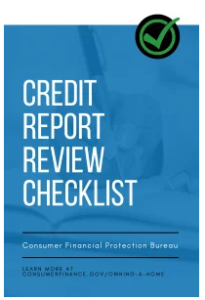Understand Your Credit
Your credit, your credit scores, and how wisely you shop for a loan that best fits your needs have a significant impact on your mortgage interest rate and the fees you pay. To improve your credit and your chances of getting a better mortgage, get current on your payments and stay current. About 35% of your credit scores are based on whether or not you pay your bills on time. About 30% of your credit scores are based on how much debt you owe. That’s why you may want to consider paying down some of your debts.
RESEARCH STARTER
- Check out interest rates and make sure you’re getting the credit you’ve earned.
- Get your credit report at annualcreditreport.com and check it for errors.
- If you find mistakes, submit a request to each of the credit bureaus asking them to fix the mistake. For more information about correcting errors on your credit report, visit consumerfinance.gov/askcfpb.
- For more on home loans and credit, visit consumerfinance.gov/owning-a-home.
TIP: Be careful making any big purchases on credit before you close on your home. Even financing a new refrigerator could make it harder for you to get a mortgage.
NOW
- If your credit score is below 700, you will likely pay more for your mortgage.
- Most credit scoring models are built so you can shop for a mortgage within a certain period—generally between 14 days and 45 days—with little or no impact on your score. If you shop outside of this period, any change triggered by shopping should be minor—a small price to pay for saving money on a mortgage loan.
IN THE FUTURE
- If you work on improving your credit and wait to buy a home, you will likely save money. Some people who improve their credit save $50 or $100 on a typical monthly mortgage payment.
- An average consumer who adopts healthy credit habits, such as paying bills on time and paying down credit cards, could see a credit score improvement in three months or more.
TIP: Correcting errors on your credit report may raise your score in 30 days or less. It’s a good idea to correct errors before you apply for a mortgage.


